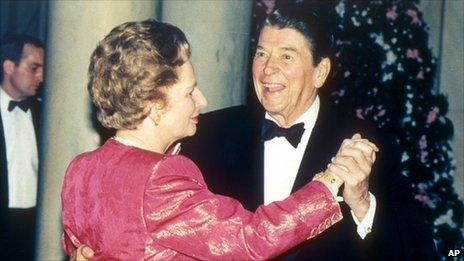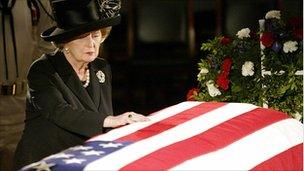Margaret Thatcher: Why the US loved her
- Published

Thatcher and Reagan shared an ideology and a chemistry
Margaret Thatcher was a very divisive figure in the UK, but not so across the Atlantic, where her popularity has endured decades after she left office. Why?
Lady Thatcher first visited the US in 1967 as a 41-year-old guest of the State Department's international exchange programme.
It marked the start of a long relationship between the UK's future prime minister and a country with which she felt great admiration and affinity.
In later years, when she resided in Number 10 and cultivated a strong bond with President Ronald Reagan, it became clear that this affection was shared by many in the US.
In 2005, the Margaret Thatcher Center for Freedom was set up by the conservative think-tank, The Heritage Foundation in Washington DC, and pledged to advance her ideals.
Its director, Nile Gardiner, says she was more popular in the US than in the UK, and for two reasons. The first is strong leadership, an important attribute in the US.
"She was the conviction politician, the figure who stuck to her principles and belief. Inevitably she's mentioned in the same breath as Churchill.
"They are the only two British politicians of the last century who are consistently cited by American politicians, with Tony Blair a distant third."
Americans on Margaret Thatcher
Legacy
The second reason is because she was someone who was steadfast in her rejection of socialist ideals.
"She was a firm believer in free market and capitalism, what most Americans believe in when it comes to the economy," says Gardiner.
"Now with all the debate about government spending, and rolling back the frontiers of the state, her legacy is increasingly important for Americans."
We will never see as close a relationship as the one shared by Reagan and Lady Thatcher, he says, and it's arguable that some of Reagan's economic reforms might not have happened without her having done the same just before in the UK.
"She challenged the relentless rise of big government and Reagan did the same. Would he have implemented them without her? Perhaps, but she made it easier for him."
The endurance of the high esteem in which she was held was illustrated in 2009, when the US House of Representatives passed a resolution "recognizing the 30th anniversary of the election of Margaret Thatcher as the first female Prime Minister of Great Britain."
She is still tremendously loved on the American right because she unleashed the free market, beat the unions and went to war with the bad guys, says Michael Goldfarb, an American journalist in London.
"She and Reagan were perfectly matched and she was seen as providing a heft to the free-market ideology that they both introduced."
But there were two difficult moments in their relationship, says Goldfarb. One was over the Falklands War, when Reagan tried to call a ceasefire. The other was two years later in 1983, when he invaded Grenada without apparently informing Lady Thatcher.
She was also not afraid of being blunt with another US president, George HW Bush. Legend has it that when Saddam Hussein invaded Kuwait in 1990, Thatcher was in the US and she told the president not to "go wobbly" in his response to this aggression.
Even as the memory of her fades, says Goldfarb, she still inspires a lot of love and admiration. Her gender added to the mythology.
"It's not so much that she was the first woman prime minister, but the fact that she was a woman behaving with such masculine strength really appealed to the right."
Leaked documents from Secretary of State Hillary Clinton's ill-fated campaign to become president suggest her aides held a strong admiration for Lady Thatcher and invoked her "smart, tough leadership" as an inspiration.
Sarah Palin has also lauded Lady Thatcher as a political heroine. She once spoke about the grocer's daughter "overcoming the odds and challenges of the status quo". But a meeting between the two women in London that was planned in 2010 never happened.
Streep role
Much is made by British pundits about the "special relationship" between the US and the UK, says Professor Shaun Bowler, a political scientist at the University of California at Riverside. Sometimes it's not special at all, but with Thatcher it did have a special quality.
Very few British prime ministers register at all with the American general public, he says, but Thatcher was the first in many years to make her mark, especially during the Falklands War and the fall of the Berlin Wall.
"I think that she made herself a much more prominent figure than she would otherwise have been through sheer force of personality.

When Reagan died, Thatcher flew to the US to attend the funeral
"My sense is that other prime ministers John Major, David Cameron and - outside the brief moment of banking crisis-driven fame - Gordon Brown, never registered that much with US public opinion.
"I have the sense that even during 'quiet' times Mrs Thatcher would have attracted more attention - she was someone to be reckoned with."
In 2011, the mythology of Margaret Thatcher was cast on the big screen and introduced to a new audience, when she received the Hollywood treatment.
Meryl Streep won an Oscar for her portrayal of the Iron Lady - but forgot to mention Thatcher in her acceptance speech.
But there's little chance of Lady Thatcher being forgotten by the rest of America. Her death has brought forth a new flood of enthusiasm and opinions about the former prime minister - and ensures that her legacy will live on.